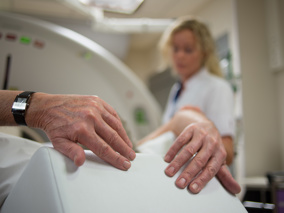Hypopharyngeal cancer
Hypopharyngeal cancer is a rare type of cancer. The cancer is in the lining of the hypopharynx, the lower part of the throat. Because this type of cancer is located in the mucous membrane, it is also called a squamous cell carcinoma . Hypopharyngeal cancer usually occurs in men over the age of 50.
On this page you can read more about the symptoms, examinations and treatments for hypopharyngeal cancer.
Learn more about hypopharyngeal cancer
Causes of hypopharyngeal cancer
Important risk factors are smoking and drinking alcohol. Hypopharyngeal cancer is more likely to occur if someone in your family has had oral cavity cancer, throat cancer, or lung cancer.
Symptoms of hypopharyngeal cancer
With hypopharyngeal cancer, you may have the following signs or symptoms:
- pain that is sometimes also in the ears
- difficulty swallowing
- the feeling of a lump in the throat
- hoarseness
- thick spots in the neck
Waiting
We want to inform you as well as possible about the waiting time per condition. We do this based on a prognosis of the current waiting list. The waiting time can vary from patient to patient for various reasons. Your attending physician will give you more information during your outpatient consultation.
-
5 days
First appointment
This is approximately how long it will take until you have your first appointment
-
5 days
Rapid diagnostics
This is approximately how long it will take before you can start rapid diagnostics at the NKI
-
7 days
Second opinion
This is approximately how long it will take before you come in for a second opinion at the NKI
 nl
nl






